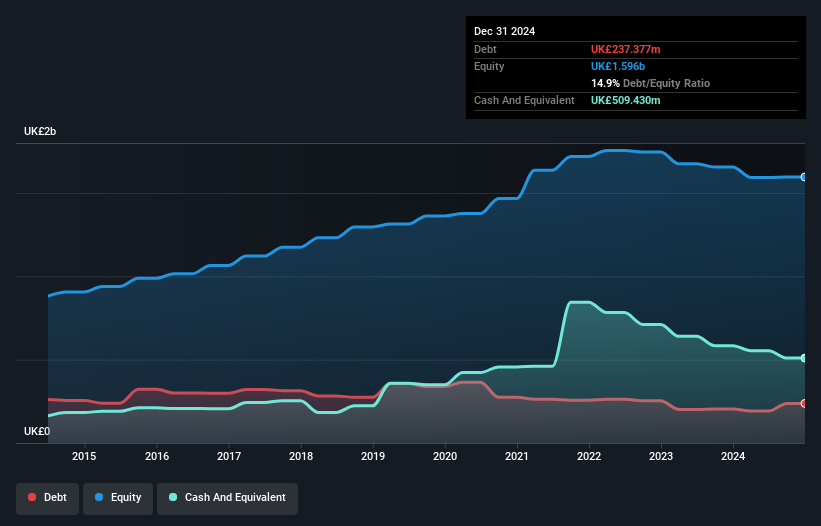Warren Buffett famously said, 'Volatility is far from synonymous with risk.' So it seems the smart money knows that debt - which is usually involved in bankruptcies - is a very important factor, when you assess how risky a company is. Importantly, Grafton Group plc (LON:GFTU) does carry debt. But is this debt a concern to shareholders?
We check all companies for important risks. See what we found for Grafton Group in our free report.What Risk Does Debt Bring?
Debt assists a business until the business has trouble paying it off, either with new capital or with free cash flow. If things get really bad, the lenders can take control of the business. However, a more common (but still painful) scenario is that it has to raise new equity capital at a low price, thus permanently diluting shareholders. Having said that, the most common situation is where a company manages its debt reasonably well - and to its own advantage. When we think about a company's use of debt, we first look at cash and debt together.
What Is Grafton Group's Net Debt?
As you can see below, at the end of December 2024, Grafton Group had UK£237.4m of debt, up from UK£204.2m a year ago. Click the image for more detail. But on the other hand it also has UK£509.4m in cash, leading to a UK£272.1m net cash position.

How Healthy Is Grafton Group's Balance Sheet?
We can see from the most recent balance sheet that Grafton Group had liabilities of UK£550.8m falling due within a year, and liabilities of UK£605.2m due beyond that. Offsetting this, it had UK£509.4m in cash and UK£276.5m in receivables that were due within 12 months. So it has liabilities totalling UK£370.1m more than its cash and near-term receivables, combined.
Of course, Grafton Group has a market capitalization of UK£1.89b, so these liabilities are probably manageable. Having said that, it's clear that we should continue to monitor its balance sheet, lest it change for the worse. Despite its noteworthy liabilities, Grafton Group boasts net cash, so it's fair to say it does not have a heavy debt load!
Check out our latest analysis for Grafton Group
But the bad news is that Grafton Group has seen its EBIT plunge 17% in the last twelve months. We think hat kind of performance, if repeated frequently, could well lead to difficulties for the stock. When analysing debt levels, the balance sheet is the obvious place to start. But ultimately the future profitability of the business will decide if Grafton Group can strengthen its balance sheet over time. So if you want to see what the professionals think, you might find this free report on analyst profit forecasts to be interesting.
Finally, a business needs free cash flow to pay off debt; accounting profits just don't cut it. Grafton Group may have net cash on the balance sheet, but it is still interesting to look at how well the business converts its earnings before interest and tax (EBIT) to free cash flow, because that will influence both its need for, and its capacity to manage debt. Over the last three years, Grafton Group actually produced more free cash flow than EBIT. That sort of strong cash generation warms our hearts like a puppy in a bumblebee suit.
Summing Up
Although Grafton Group's balance sheet isn't particularly strong, due to the total liabilities, it is clearly positive to see that it has net cash of UK£272.1m. The cherry on top was that in converted 100% of that EBIT to free cash flow, bringing in UK£200m. So we don't have any problem with Grafton Group's use of debt. Of course, we wouldn't say no to the extra confidence that we'd gain if we knew that Grafton Group insiders have been buying shares: if you're on the same wavelength, you can find out if insiders are buying by clicking this link.
If, after all that, you're more interested in a fast growing company with a rock-solid balance sheet, then check out our list of net cash growth stocks without delay.
New: Manage All Your Stock Portfolios in One Place
We've created the ultimate portfolio companion for stock investors, and it's free.
• Connect an unlimited number of Portfolios and see your total in one currency
• Be alerted to new Warning Signs or Risks via email or mobile
• Track the Fair Value of your stocks
Have feedback on this article? Concerned about the content? Get in touch with us directly. Alternatively, email editorial-team (at) simplywallst.com.
This article by Simply Wall St is general in nature. We provide commentary based on historical data and analyst forecasts only using an unbiased methodology and our articles are not intended to be financial advice. It does not constitute a recommendation to buy or sell any stock, and does not take account of your objectives, or your financial situation. We aim to bring you long-term focused analysis driven by fundamental data. Note that our analysis may not factor in the latest price-sensitive company announcements or qualitative material. Simply Wall St has no position in any stocks mentioned.
About LSE:GFTU
Grafton Group
Distributes and sells building materials and construction related products in Ireland, the United Kingdom, the Netherlands, Finland, and Spain.
Flawless balance sheet, undervalued and pays a dividend.
Similar Companies
Market Insights
Community Narratives




